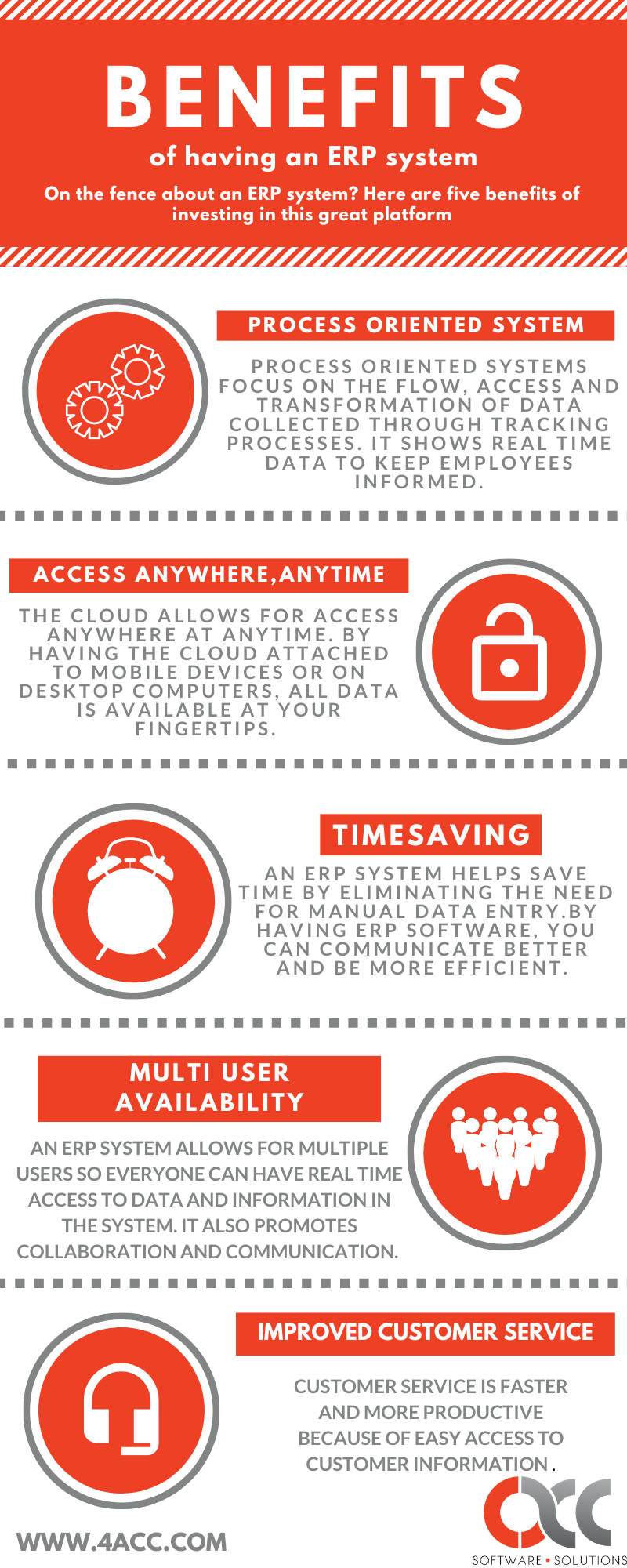Erp benefits infographic acc 4acc
ERP (Enterprise Resource Planning) systems have become an indispensable tool for businesses, irrespective of their size. They offer a multitude of benefits that can streamline operations, increase efficiency, and enhance decision-making processes. In this post, we will explore some of the key advantages that ERP brings, particularly for small businesses.
The Power of ERP

Streamlined Operations
ERP systems enable small businesses to integrate various operational aspects such as finance, human resources, manufacturing, and supply chain management into one comprehensive platform. By doing so, it eliminates the need for separate software systems for each department and promotes seamless collaboration across the organization.
With ERP, small businesses can automate repetitive tasks, reduce manual errors, and eliminate redundant data entry. This automation not only saves time but also reduces the risk of inaccuracies, enabling employees to focus on strategic activities that drive growth and profitability.
Enhanced Efficiency and Productivity

Implementing an ERP system in a small business can significantly improve overall operational efficiency and productivity. By providing real-time access to critical business data, ERP eliminates the need for employees to waste time gathering information from multiple sources. This accessibility enables faster decision-making, allowing businesses to respond swiftly to changing market dynamics and customer demands.
ERP systems also offer advanced analytics and reporting capabilities, which provide valuable insights into key performance indicators (KPIs) and business metrics. These insights enable small businesses to identify bottlenecks, make data-driven decisions, and optimize their processes for better efficiency and productivity.
Cost Savings
The cost savings obtained by implementing an ERP system can be substantial for small businesses. ERP eliminates the need for separate software licenses, maintenance, and support contracts for individual departments. By centralizing all operations in one system, businesses can eliminate redundancies, streamline workflows, and reduce operational costs.
Moreover, ERP systems can help optimize inventory management, reducing carrying costs and minimizing stockouts. By having a clear view of inventory levels and demand trends, businesses can avoid overstocking or understocking, thereby maximizing cash flow and minimizing losses.
Better Customer Service and Satisfaction
ERP systems enable small businesses to have a holistic view of customer interactions and preferences. By integrating customer relationship management (CRM) functionalities, businesses can effectively track sales, manage customer inquiries, and provide personalized support. This integration ensures that all customer touchpoints are recorded and easily accessible, allowing businesses to deliver exceptional service and enhance customer satisfaction.
Conclusion
In conclusion, ERP systems offer a plethora of benefits for small businesses. From streamlined operations and enhanced efficiency to cost savings and improved customer service, ERP has the potential to revolutionize the way businesses operate. By investing in an ERP system tailored to their specific needs, small businesses can fuel growth, gain a competitive edge, and achieve long-term success.